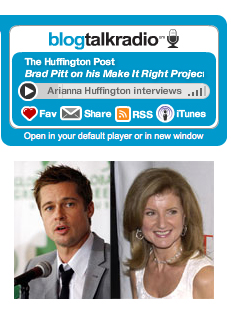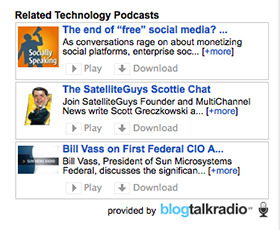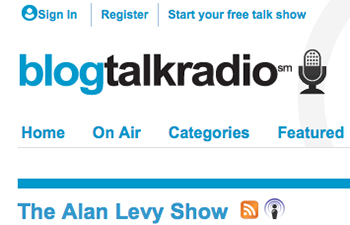This is one in an occasional series on MediaShift where I discuss issues in-depth with thought leaders in online media. The format has changed to give you a profile of the person, as well as more of our dialogue — including audio clips. If you have suggestions for future Q&As or want to participate yourself, drop me a line via the Feedback Form.
Profile
Alan Levy
Age: 49
Hometown & Current Location: Woodcliff Lake, New Jersey

Favorite Websites: Scripting News; TechCrunch; AdAge; Media Memo; PaidContent; NY Times’ DealBook
Online Persona: The Alan Levy Show on BlogTalkRadio; Alan Levy on The Huffington Post; Alan Levy on Twitter
What Makes Him a Thought Leader: Levy has a background as an entrepreneur in the telecom industry, selling Destia for $1 billion to Viatel and using some of those proceeds to launch BlogTalkRadio. This startup allows anyone to host an online talk-radio show for free, providing a call-in number for listeners and live streaming audio. The archives are then turned into audio podcasts. BlogTalkRadio sells sponsorships in its more popular shows and shares the revenue with hosts, and also has a premium offering for organizations like Hachette Book Group or the Pentagon to have their own “private radio network” online. Levy also hosts his own show on the site.
Stats for BlogTalkRadio:According to Compete.com, BlogTalkRadio had more than 1 million unique visitors to its site in January 2009, and the company says that’s up 418% from the previous January. The company estimates that millions more have listened to shows that have been embedded on outside sites.
Q&A
What technology are you using from your previous company to help run BlogTalkRadio?
Levy: I came up with idea for BlogTalkRadio in March 2006 when my dad was ill with lymphoma. I created a blog for him and didn’t know much about the blogosphere. I started researching blogs and was fascinated at the scale and amount of blogs. I kept hearing about ‘join the conversation’ and as a phone guy, I thought, wouldn’t it be interesting if we could integrate the phone network with the web? And that’s what we did with BlogTalkRadio.
The technology of the service is based on the phone company I own, and BlogTalkRadio is one of the applications that sits on that network. So you as a host running a show would dial a phone number that we provide you, and you can list the number for people to dial in to interact with you. It’s really a medium we created that sits on top of a phone network.
Is there something specific about this phone network that works well with your application, or could anyone with a phone network create something similar?
Levy: We’ve produced 200,000 episodes since we launched. When we launched, no one had come up with this idea. We patented the idea to do a live streaming event, and integrated many tools on the front end, like a live switchboard, and you can upload MP3s on the fly. You can have unlimited listeners, we stream through Akamai. We syndicate the content through RSS into iTunes and Flash that we’ve enhanced. Certainly another phone company could get into this, but we have both the social side, the content on the network and the huge amount of infrastructure we built — so we really have the first-mover advantage.
Hear Levy explain what technology BlogTalkRadio is trying to patent:
So far what have been some of the highlights of the company and challenges?
Levy: There have been a lot of highlights. When my dad died and we launched in September ’06 — this was one of the challenges: It’s not your prototypical Silicon Valley-funded company. I live in New Jersey, I’m an entrepreneur and this is my second or third go-round with this. How do you get awareness? How do people find our website? We stayed focused and got our message out: People can create a podcast using their phone. It’s very easy. I looked at the podcast space, and it was very complicated, there’s no distribution platform other than iTunes, and so on.
On the positive side, three or four months into doing this, we started broadcasting live from Afghanistan, with an embed there named Scott Kesterson [who did the Words of War show]. Every Friday morning he would be live from Kabul or from Kandahar, and people could listen in and ask him questions. And the soldiers were listening to what was going on. I thought this was incredible and powerful, so we sent it to the Pentagon, and we got a reply back in 4 hours from their new media department saying ‘interesting.’ Now, the Pentagon has a network on BlogTalkRadio. Now you know the medium has arrived when the Pentagon is embracing it.

We also have Wal-Mart, who’s come on the network. We’re excited about our relationship with Wal-Mart and enable them to have conversations with mom bloggers and our community. By democratizing the media, we end up having stars come on the network. Suzanne Somers, for example, is on. We’ve had Brad Pitt, John McCain, Yoko Ono, Brian DePalma, Salman Rusdie, and we don’t have any kind of central booking. We host these conversations and it’s exciting to see.
Tell me more about the private networks. How do they work?
Levy: We created these private networks — you can find them on BlogTalkRadio under the Networks tab. These brands can aggregate conversations in their own area. So Woman’s Day magazine, for example, has their own branded network, RadioWD, and they do a show about finance and other topics. It’s an extension of the Woman’s Day brand, and we’re providing them with a chance to monetize it, as well.
We can get sponsors for these shows from consumer product companies, to sponsor a Wal-Mart show. We’re having so many conversations with companies such as publishers, consumer products companies, government, and they’re starting so many conversations that they can then repurpose on their websites.
Do they pay to create these networks?
Levy: The free networks, you can come in to listen, host your show, and we own the content, we have the right to get sponsorships. The host can participate in revenue sharing, and we go out and sell shows, categories, tags or key words. That content goes up live on BlogTalkRadio and the archive can reside anywhere — their blog or Facebook page.
On the private networks, we don’t own the content, it’s owned by the brand. They can simulcast an event on their site while it’s on our site. They have enhanced moderation and switchboard functionality. With these brands, I’m noticing they’re more and more interested in reaching our network, our users, because we have millions of listeners for these shows. So they want to integrate their brands into our community, so we do that through banners, through advertorials, by getting them on some of our top shows.
For instance, I interviewed author David Baldacci a few weeks back as one of the Hachette Book Group’s top authors. These types of conversations are helpful for them, and we work with syndication partners and embed the content into a syndication widget to provide real scale for these conversations.
Do you disclose that you have that relationship with Hachette when you do that kind of interview?
Levy: Hachette Book Group is a branded network, but the interview did not come through Hachette. The publicist came to us and asked us if we wanted to interview him, and he wrote “Divine Justice” among other things. From that instance, this was just a publicist trying to get visibility for a book coming out.
[Editor’s Note: In fact, Levy does not disclose the Hachette connection on his show with Baldacci, nor the same connection with Hachette author Howard Lindzon on another show (though Levy does mention that Lindzon is an investor in BlogTalkRadio). This lack of transparency could well undermine Levy’s own show, unless he discloses the business relationship he has with Hachette when interviewing their authors.]
Levy explains why the name “BlogTalkRadio” is not hampered by the word “blog” in it:
You got $4.6 million in funding last year, and said you would spend it on your private network offering as well as adding video. How have those efforts gone and how have you spent your funding?
Levy: The initial funding of BlogTalkRadio was by me, with my background in telecom and had some success with that. Then back in July we brought in some great investors, including Kraft Group, the owners of the New England Patriots. The funding was to help us scale up and improve the tools. The branded network provided a real focused business model for the company. Our traffic was up more than 400% in ’08, and we will hit 1,000 live episodes a day, which is much higher than it was last summer.
As for video, there are a lot of platforms out there, and I’m not a fan of live streamed video on the web. I don’t see it being viable from a business standpoint, and we have to build a business that can support itself with multiple revenue streams. What concerns me about video is that it’s unclear that you can guarantee the content will be acceptable to the stakeholders in the company. And with the major brands we’re talking to, it has to be highly produced video. They’re not going to do mobile phone, webcasting, or one webcam sitting on a person doing a show. They’re hesitant to get into video.
That being said, I see us possibly using video in multiple ways on BlogTalkRadio. I see us having a high end video solution for our media partners, for the enterprise. We do have video that the hosts can use in our chat rooms, for our featured hosts, just like uStream and other platforms. We just don’t promote it as much. With BlogTalkRadio, we’re having this conversation, and we could have people calling in to talk with us. With video, you can’t have that, so this is what differentiates us.
How do you see the revenue streams breaking down between the premium offering and advertising on the free shows?

Levy: I don’t have a percentage I could share with you. It’s integrated, and it is still evolving. A lot of the conversations we have with brands, they’re interested in having off-site widgets. For example, if you go to Technorati, and click on Technology, you’ll see a 300 by 250 [pixel] ad unit that we have [highlighting content]. We can embed content into that ad unit and have it displayed anywhere online. Is that a branded network or a sponsored ad unit? It’s really just a blur.
How does the advertising work? Do you insert ads into live shows or in archives?
Levy: We have our own ad-serving technology, so we can insert pre-roll audio ads into the shows, along with banner ads. There’s also a number of shows where advertisers want our hosts to talk about their products on our shows. Like, ‘this show is sponsored by Audible Books’ or a particular brand. We work with some hosts that are interested in participating in these campaigns. I see a huge opportunity to create word-of-mouth campaigns to promote movies or other things, and these would be disclosed as sponsorships. We have a lot of flexibility in how we would introduce advertising into this content.
Levy talks about the communities on BlogTalkRadio including The Fly Lady and her huge Yahoo Group:
What about adult content and language? When doing live radio, I’m guessing a lot of funky things happen. What kind of filtering do you do, and what’s your policy about adult content?
Levy: I’ve always been focused on content. I have a team of people who listen to shows, and there’s a way for people to send notes to us via email and say they heard something or something’s going on. Audio is much different than video, and the content can be controlled much better. We’re not interested in porn or adult content, but people cursing and language…you can write ‘mature’ on your show so we are very cognizant about that.
Where do you draw the line?
Levy: If it’s exploitative. Anything to do with hate. We’ve had conversations around politics, and aggressive parts of the right or 9/11 truth-ers — I’m not comfortable with that on the network. We don’t have any editorial view, but we don’t accept hate-mongering. And once someone is thrown off of the network it’s very hard to get back on. And there are very few other platforms to communicate in this way. People are more careful about it. With language, there will be cursing on some of the late night shows.
Out of the really successful shows, how much can they make from a show in ad revenue-sharing?
Levy: We have some shows where the hosts are getting close to $1,000 a month. They do one or two shows a week for an hour. It runs the gamut and depends on how they work on promoting the shows in their community. We provide them with the tools, and more and more we are providing them with sponsorships. The sponsors will want to get on the most popular shows. There are possibilities of getting thousands of dollars a month. Most won’t but most bloggers aren’t doing it for the money either, but just to participate in community coversations. It varies on the audience and the sponsor interest.
Levy explains how the revenue-sharing works with hosts on BlogTalkRadio:
*****
What do you think about BlogTalkRadio? Have you run a show there or listened to shows? What could be improved? Share your thoughts in the comments.


I notice that he mentions aggressive people on the far right but makes no mention of aggressive people on the far left. Does that mean that those people are acceptable? Or, in his opinion, is passionate discussion only considered “hate” speech when it comes from the right? For that matter, how far right does a person have to be to be considered a “hate-monger” in this guy’s book? Did he find all the leftist talk of assasinating George Bush perfectly acceptable? Does he find any dissent with our current president’s policies to be “hate-mongering”?
Inquiring minds want to know.
Of course the far left is acceptable. The PC police have to shut down any rational discourse because in the arena of reality they get beat every time. :P
If you do not follow these rules, we will remove your post. Keep it civil, folks!